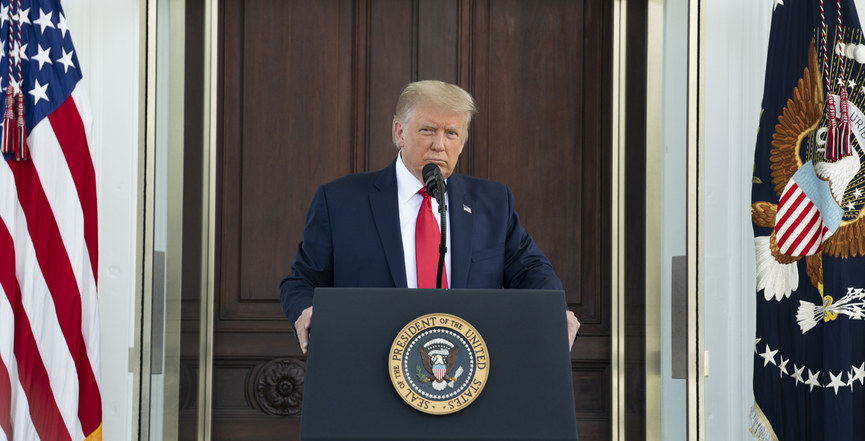Humanity, confronting the worst pandemic in a century, should be engaged in an unprecedented collective race for a cure. Under the World Health Organization, vaccine development is proceeding through a vast, global collaboration. Noticeably absent, however, is the United States.
Here, President Donald Trump is intent on releasing a vaccine before the November election, placing his lust for power above the urgent demands of public health. Millions of Americans could be harmed if Trump forces the release of a vaccine before it’s proven to be safe and effective.
The coronavirus contagion disproportionately impacts African American, Latinx and Indigenous communities, exposing long-standing inequities and systemic racism in our health-care system. Despite this, communities of colour in the U.S. have been underrepresented in the clinical trials for prospective COVID-19 vaccines.
Centuries of abusive treatment at the hands of medical researchers have left people of colour rightly skeptical of the experimental process. Everyone wants a cure for COVID-19 and a return to a semblance of life as we knew it. But the path forward must be inclusive, ethical and unambiguously free of Donald Trump’s racism and political thuggery.
The most notorious abuse of African Americans at the hands of the medical establishment was the Tuskegee syphilis experiment. In 1932, the U.S. Public Health Service recruited 400 African American men with syphilis, studying the disease’s progression when purposefully left untreated. The subjects were given useless placebos and tracked over decades as their symptoms worsened, even though penicillin was identified as a reliable treatment in 1945.
Syphilis can disfigure, cause dementia, blindness, extreme, chronic pain and death. Repeated concerns with the unethical study were ignored, until a whistleblower’s account of the experiment to the press in 1972 shut it down.
“It’s important to understand that there was a scientific animus called ‘scientific racism,'” Harriet Washington, author of Medical Apartheid: The Dark History of Medical Experimentation on Black Americans from Colonial Times to the Present, said on the Democracy Now! news hour. “It posited that Black people were very, very different from whites, medically and biologically. This provided a rationale not only for the institution of slavery — slavery probably could not have persisted if there hadn’t been this medical underpinning — but also for the use of Blacks in research.”
Harriet Washington describes the Tuskegee experiment and its historical antecedents, how enslaved African Americans, while enduring forced labour, violence, malnutrition and exhaustion, were also subjected to medical experimentation.
Enslaved women suffered painful gynecological experiments at the hands of Dr. J. Marion Sims, considered the “father of gynecology.” New York City finally removed a statue of Sims from Central Park in 2018. Following emancipation, African Americans were still forced into medical studies, often through coerced participation while imprisoned.
Further mistrust of medical researchers was sown among many African Americans after it was revealed that a cell line used worldwide for research for decades, so-called HeLa cells, were actually taken from an African American cancer patient named Henrietta Lacks, without her or her family’s knowledge.
African Americans are at least 2.4 times as likely as whites to die from COVID-19, and account for at least 21 per cent of U.S. COVID deaths, but only 13 per cent of the U.S. population, according to The Covid Tracking Project. Latinx and Native American and Alaska Native people are more than 1.5 times as likely to die of the disease than whites. “As we strive to overcome the social and structural causes of health-care disparities, we must recognize the underrepresentation of minority groups in COVID-19 clinical trials,” a group of researchers wrote in a recent issue of the New England Journal of Medicine.
President Trump has mishandled the federal response to the pandemic. Recorded conversations between journalist Bob Woodward and the president reveal that Trump had been briefed on the severity of the pandemic as early as February 7, but decided to downplay the crisis in public statements. Instead, he held re-election rally after rally around the country. He did not declare a national emergency until March 13.
Columbia University researchers reported in May that more than 80 per cent of U.S. deaths and infections could have been prevented had social distancing and other control measures been implemented just two weeks earlier.
Amidst an historic pandemic, a massive recession devastating working people while the wealth of the investor class surges, with unprecedented mass mobilizations against racism and police brutality and a critical election less than two months away, the last thing we need is an aspiring autocrat like Donald Trump perverting the worldwide effort to create a COVID-19 vaccine.
The research must be scientifically sound, transparent and inclusive, and any vaccine thus developed must be distributed equitably around the world, for free.
Amy Goodman is the host of Democracy Now!, a daily international TV/radio news hour airing on more than 1,300 stations. She is the co-author, with Denis Moynihan, of The Silenced Majority, a New York Times bestseller. This column originally appeared on Democracy Now!
Image: The White House/Flickr




